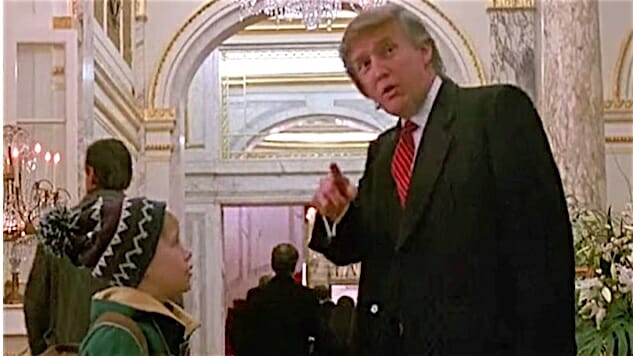Cinema Under the Influence: Donald Trump
Exploring the interactions and influence on cinema of famous figures outside the world of film
Movies Features Donald Trump
In her new column, film critic Christina Newland focuses on one famous figure outside the world of film, exploring the individual’s interactions and influence on cinema. Looking at architects, philosophers, pop singers, fashion designers and beyond, Cinema Under the Influence will reveal the cultural cross-pollination that has affected—and sometimes infected—movies over the years.
Donald J. Trump
Real Estate Mogul, 45th President of the United States
1946 –
From the 1980s onward, American cinema has enjoyed borrowing its villains and stock characters from the larger-than-life persona of Donald Trump. He’s the spiritual antecedent to every autocratic mogul with a gilded apartment and the aesthetic pinnacle for every rich-boy bully with a fake tan. Sometimes this manifests itself as literal parody, as in Back to the Future 2 (1989), where Biff Tannen owns a gleaming, gaudy tower inscribed with his name, wears a questionable blond toupee, and runs a corrupt empire that bribes politicians. Screenwriter Bob Gale has openly admitted that the film’s villain was based on Trump, a fact that has since been pinballed around the internet with considerable glee. Other film and television characters are more loosely inflected with the spirit of Trump, from The Simpsons’ Mr. Burns to Wall Street’s Gordon “Greed is Good” Gekko.
In a more literal sense, Trump actually appeared in a series of self-aggrandizing film cameos during the early-to-mid ’90s, most notably in Home Alone 2: Lost in New York. Most crass of all has to be his small-screen appearance in a Pizza Hut commercial. And yet none of these appearances embodies the Trumpian persona better than the ones that riff on what he represents without even invoking him: reptilian and uniquely American corporate business practices (The Wolf of Wall Street), soulless gentrification (In Jackson Heights), and rabble-rousing public relations tactics (Network). Given our present moment in time, even in films of the past, rich slimeballs and demagogues can’t help but have a Trump-like familiarity to them.
The inestimable effect that the Trump presidency will have on cinema to come has yet to be written—or released on our screens. Hollywood is notoriously slow to respond to social and political upheaval, and the production process always sees a film’s release arrive a while after whatever event it may seek to portray or comment on. But retrospective criticism nonetheless tends to group films as reflective of particular times, and the films from 2016 onward will forever be seen in dialogue with—or in resistance to—the Trump administration. There are the films that riff on racist yuppiedom and fascist tendencies of the American populace, like The Purge: Election Year (2016), and the horror-comedy of suburban whiteness in Get Out (2017). Even without a directly Trump-esque presence, American cultural forces are swirling around in resistance to our xenophobic, blowhard commander-in-chief. Here’s to the next few years of filmmaking that call him out for what he is.
Christina Newland is a writer on film and culture for VICE, Esquire, Sight & Sound, Little White Lies, and others. She’s a displaced New Yorker in love with ’70s Hollywood and boxing flicks.